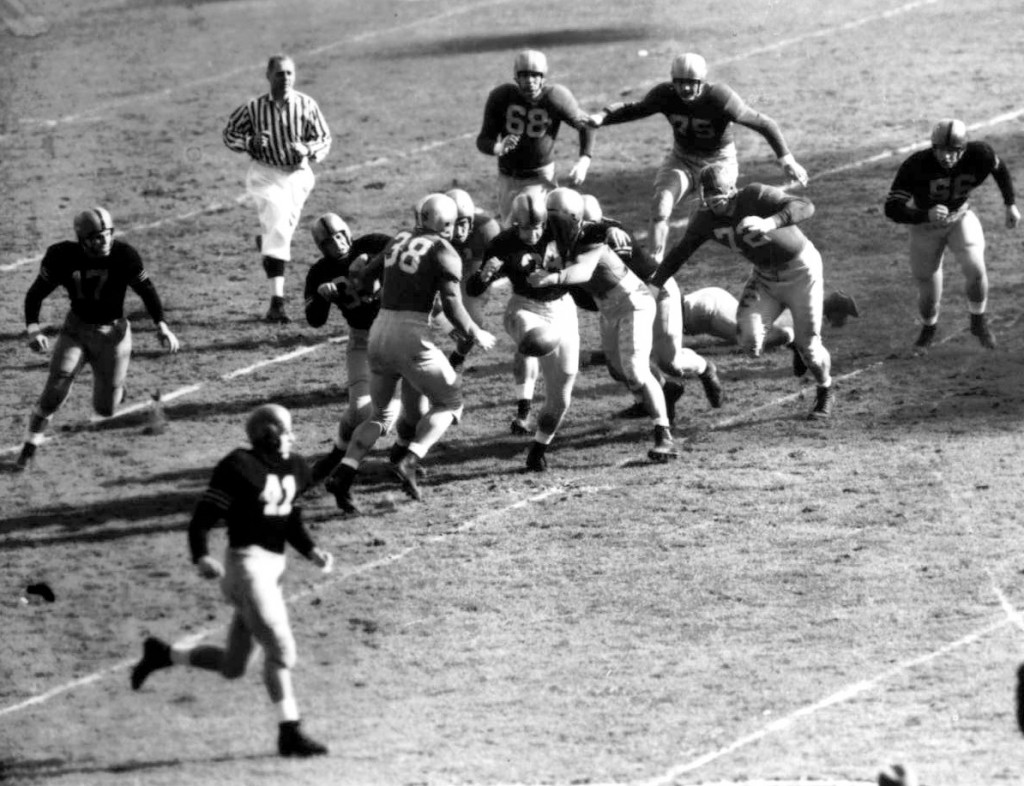 An old house sat near a creek that was a subsidiary of the mighty Mississippi River. For many years, since the early part of the 20th century, the plain once prone to floods was spared by a levy system built after the Second World War. The house was built on a raised area of that plain, and had survived numerous storms in the decades that followed the building of the levy system – completely unharmed by nature’s forces. This time was different…
An old house sat near a creek that was a subsidiary of the mighty Mississippi River. For many years, since the early part of the 20th century, the plain once prone to floods was spared by a levy system built after the Second World War. The house was built on a raised area of that plain, and had survived numerous storms in the decades that followed the building of the levy system – completely unharmed by nature’s forces. This time was different…
It was the Spring of 1991, and the rains had been particularly heavy, stressing the levy system beyond its normal tolerances. For the owners of one little house, it started as just a trickle of water, seeping through the lower cracks in the foundation walls of the house. The occupants of the house noticed as the swollen stream crept over the embankment out back and the level of the water eventually reached above the sills of the small three-paned venting side windows of the basement, pushing through every crack and filling up the basement with water. As the water pushed in around the wood frames, cartons and plastic bags began floating about in the small pond that was once the basement floor… one foot, two feet. Pilots lights were snuffed out on the gas hot water heater and the furnace. A loud “POP” sounded as the power shut down to the house. The people inside scurried about gathering belongings in an attempt to rescue what they could…. But it was all for nothing. Moving fast, the water pushed up the stairs, as the family retreated into the attic, shoving a few boxes of picture albums and fine silver onto the ledge of the roof. The water began to push up through the floor boards and into all the living space. At the very same time, the water of the stream, now entirely surrounding the home, began to press like a flattened fountains through every crack in the house. In what seemed like moments, the rooms went from dry to filled with water.
“Cracks” and “pops” could be heard as the old house shuddered against the pressure of the flow of water buffeting the north side of the house. Several large limbs, swept along by the flow, crashed into the side of the house. With each, the frame shook. The house moaned and murmured as if gasping for air and struggling to cling to its block foundation. By now, the small family had punched a hole in the roof and moved onto the top peak of the house. Rescue teams were making their way to save families that were unaware of the levy break and this family could only hope they would arrive in time. When the helicopter spotted them atop the house, the pilot knew the house was minutes from collapse… because houses were not made to withstand that kind of pressure. Rooms that were normally filled with sweet, fresh country air would not hold up to the crushing weight of swampy water.
Seeing a room filled with water is unnatural, and in a case like a sudden overflow flood, even scary. Living rooms weren’t designed to become fishing ponds, and since the Fall of man nature hasn’t been a consistent friend to man. It is powerful, because the God that created it is powerful. It can be punishing, as if fighting us from trying to subdue the landscape around us. Unleashed and uncontrolled, it can be devastating. In the face of it, one feels the “smallness” of man – our inherent vulnerability and the limits of our intelligence and power. All that can be seen by rooms filled by a river.
I mention the awesome view of that day because of another scene of a room filled with a powerful and unnatural flow that rightly made men feel small. Tucked in the very end of the Book of Exodus, but still only a small portion of the way through the desert experience with God, there is a story of the day God filled the tent of meeting with His manifest presence – His glory. It was a day of celebration, and a day well prepared for – but it was not a day that men controlled. God showed up at the door, and when God makes an entrance into the room – it is unmistakable. His power created nature. His might flung the stars into place. No room contains Him, and His mighty presence forces man to feel tiny and undone. The hard truth is that God didn’t show Himself in these powerful manifest ways on a whim– these were carefully planned events that had specific settings. If you think we stage the arrival of a President – you haven’t seen anything yet!
Key Principle: There are special times when God’s moves are obvious and powerful – but they are not haphazard – they are prepared and planned.
Before we seek to understand the conditions of God’s manifest presence, can I ask you something? Don’t you WANT God to do that in some place where you are in your life. Don’t you really, honestly, want to see His power so profoundly moving on your life, your family, your church, your community, your country, your Congress, your company – that NO ONE who stands near can attribute the marvelous presence to anything but a GOD THING in your midst?
It happened many times before. If you went back to 1620 and read of the Pilgrim diaries of William Bradford, Edward Winslow, Robert Cushman, John Robinson you would see one of the times when men huddled in prayer and saw God’s hand. The diary called Mourt’s Relation reflects death and hardship, but commitment to Jesus Christ and His message – and the power of God that flowed in the lives of the early arrivers. That story is largely snuffed out of our secular dominated histories of the day – but the primary sources are stubborn, and they reflect statements of the earliest arrivers like this one from William Bradford:
“May not and ought not the children of these fathers rightly say: “Our fathers were Englishmen which came over this great ocean, and were ready to perish in this wilderness; but they cried unto the Lord, and he heard their voice, and looked on their adversity, etc. Let them therefore praise the Lord, because he is good, and his mercies endure forever. Yea, let them which have been redeemed of the Lord, show how he hath delivered them from the hand of the oppressor. When they wandered in the desert wilderness out of the way, and found no city to dwell in, both hungry, and thirsty, their soul was overwhelmed in them. Let them confess before the Lord his loving kindness, and his wonderful works before the sons of men.”
Bradford argued: “Don’t let future generations of Americans celebrate their founding fathers strength – tell them, tell them that these ordinary souls were famished and nearly defeated – and it was the hand of God, the provision of His power that saved them!
That should lead us to a foundational understanding of one truth: Even if God shows up and saves dramatically people, the story will be adjusted in time to the heroics of men. God will eventually be marginalized in the story, and the men that experienced Him will be elevates.
Moses experienced that. He became a mythical “super Jew” to many – but that is NOT his true story anymore than the tales of “mighty self dependent and faithless Pilgrims”. The stories that pass for history in many a classroom now are the myths – for the TRUTH we must go back to the primary source material. For the Pilgrims it was the diaries of the journey. For Moses it was Exodus and Numbers.
Five Conditions
Look at Exodus 40, and you will quickly understand that God made an entrance according to a very specific set of five parameters He declared in advance. God set the terms of His arrival. The five conditions were these:
1: God made the CALENDAR – the TIMING of the events were in His hand.
Exodus 40:1 Then the LORD spoke to Moses, saying, 2 “On the first day of the first month you shall set up the tabernacle of the tent of meeting.
2: God chose the STAGE – the BACKDROP of the events were His choice.
Exodus 40:3 “You shall place the ark of the testimony there, and you shall screen the ark with the veil. 4 “You shall bring in the table and arrange what belongs on it; and you shall bring in the lampstand and mount its lamps. 5 “Moreover, you shall set the gold altar of incense before the ark of the testimony, and set up the veil for the doorway to the tabernacle. 6 “You shall set the altar of burnt offering in front of the doorway of the tabernacle of the tent of meeting. 7 “You shall set the laver between the tent of meeting and the altar and put water in it. 8 “You shall set up the court all around and hang up the veil for the gateway of the court.
3: God picked the CEREMONY – the SPECIFIC OCCASION of the events were specified.
Exodus 40:9 “Then you shall take the anointing oil and anoint the tabernacle and all that is in it, and shall consecrate it and all its furnishings; and it shall be holy. 10 “You shall anoint the altar of burnt offering and all its utensils, and consecrate the altar, and the altar shall be most holy. 11 “You shall anoint the laver and its stand, and consecrate it.
4: God picked the CONDITION – the PREPARATION of the men in the scene was commanded.
Exodus 40:12 “Then you shall bring Aaron and his sons to the doorway of the tent of meeting and wash them with water.
5: God picked the COSTUMES – the ENTIRE APPEARANCE of the men in the scene was carefully planned.
Exodus 40:13 “You shall put the holy garments on Aaron and anoint him and consecrate him, that he may minister as a priest to Me. 14 “You shall bring his sons and put tunics on them; 15 and you shall anoint them even as you have anointed their father, that they may minister as priests to Me; and their anointing will qualify them for a perpetual priesthood throughout their generations.”
It is absolutely clear from the reading of the first fifteen verses that God staged His arrival by sending ahead full instructions of what He wanted to ready men to experience His manifest presence. That is CRITICAL to see if we WANT to experience that in our own lives. Don’t forget, God was already IN THEIR LIVES, just as He is already in ours. This isn’t about getting God to pay attention to us – this is about a powerful manifestation of God in our lives.
- This is about falling to our knees over the broken homes of our community and asking God to heal the wounded hearts of those who need Him to powerfully do a work.
- This is about crying out to God on behalf of a government that is now forcing those of us who believe that abortion is murder to begin to pay for the procedure.
- This is about pleading with God on behalf of the darkness of Islam that has covered over a third of the earth with a stirring caldron of anger and bitterness – that can flash out of control with an offense at all.
- This is about weeping before God’s throne for a nation hell bent on removing God from every public center until planes crash into buildings, and then in hypocrisy praying on the capitol steps and singing the request: “God bless America.”
This is about God showing up because His people took Him seriously and looked thoughtfully at the place they prepared for His coming.
- Don’t ask God to come into your home and deal with your wayward teen while you are hiding pornography on your hard drive.
- Don’t expect God’s hand to heal your economy when you have decided to borrow and not repay, to promise and not fulfill. Excuses are the seed bed of rejection of God’s principles.
Instead, ask what God WANTS to stage a mighty entrance of manifest presence in your life! Don’t just assume that the problem is on GOD’S SIDE. He may be willing, but you may NOT TRULY be willing to do what is necessary to have Him perform an incredible work.
One caveat: God can decide to do a work at any time. He doesn’t NEED us to do anything for His power to mightily change situations. MANY are the times when God has dramatically worked and NO ONE was asking Him to work that we can discern from the record. I am NOT limiting what God CAN do, I am suggesting that His Word provides a pattern of WHAT HE CARES ABOUT in preparing the room for His work! Let me say it in clear and unmistakable questions:
- Are you ready to so desire and long for God’s work in you and through you so much that you will take out a calendar and seek God for a special time in the days ahead where you will ASK HIM to move on your life? That’s the pattern from Exodus 40:1-2.
- Are you ready to then begin to prepare by staging your life in a way that everything you are saying, everything you are watching, every hunger you are feeding is ALL yielded and appropriate for God’s arrival? That is the pattern of Exodus 40:3-8.
- Are you ready to take your TV, your computer, your cell phone, your couch, your car, your clothing and scour them to be clean for every good purpose? Will you delete from your life the books that are tainted, the movies that cling to a flesh feeding frenzy, the songs that call for your old man to emerge and be heard? That is the pattern of consecration in 40:9-11.
- Are you ready to get clean yourself. Are you willing to place yourself in the position of Divine inspection so that God can challenge every thought, every relationship, every desire – and wash it with His right ways? That is the pattern of the cleansing of 40:12.
- Are you willing to set aside all the clothing and settings of your personal life that once were a part of your old way? Are you willing to check your tongue for words that are true and clean and encouraging? That is the pattern of the costume fitting in Exodus 40:13-15.
These may be the real reasons you have felt God wasn’t moving powerfully in your life. God is willing to powerfully work, His Word is FULL of places where that happened. Could it be that an occasional nod to His Word is insufficient for a powerful move in your life?
Three Responses
Let’s look at three ways Moses RESPONSED to God’s direction:
First, Moses OBEYED at the SPECIFIED TIME – he did what God said WHEN God said it.
Exodus 40:16 Thus Moses did; according to all that the LORD had commanded him, so he did. 17 Now in the first month of the second year, on the first day of the month, the tabernacle was erected.
Second, Moses OBEYED in the SETTING – he arranged and assembled everything as God directed.
He used everything God told him to use, and nothing BUT what God told him to use.
He set up the place of meeting: Exodus 40:18 Moses erected the tabernacle and laid its sockets, and set up its boards, and inserted its bars and erected its pillars. 19 He spread the tent over the tabernacle and put the covering of the tent on top of it, just as the LORD had commanded Moses. 20 Then he took the testimony and put it into the ark, and attached the poles to the ark, and put the mercy seat on top of the ark. 21 He brought the ark into the tabernacle, and set up a veil for the screen, and screened off the ark of the testimony, just as the LORD had commanded Moses.
He arranged each piece as God commanded: Exodus 40:22 Then he put the table in the tent of meeting on the north side of the tabernacle, outside the veil. 23 He set the arrangement of bread in order on it before the LORD, just as the LORD had commanded Moses. 24 Then he placed the lampstand in the tent of meeting, opposite the table, on the south side of the tabernacle. 25 He lighted the lamps before the LORD, just as the LORD had commanded Moses. 26 Then he placed the gold altar in the tent of meeting in front of the veil; 27 and he burned fragrant incense on it, just as the LORD had commanded Moses. 28 Then he set up the veil for the doorway of the tabernacle. 29 He set the altar of burnt offering before the doorway of the tabernacle of the tent of meeting, and offered on it the burnt offering and the meal offering, just as the LORD had commanded Moses. 30 He placed the laver between the tent of meeting and the altar and put water in it for washing.
Third, Moses OBEYED concerning the CONDITIONS – he washed everything completely in preparation for the arrival of God’s powerful manifest presence.
Exodus 40:31 From it Moses and Aaron and his sons washed their hands and their feet. 32 When they entered the tent of meeting, and when they approached the altar, they washed, just as the LORD had commanded Moses. 33 He erected the court all around the tabernacle and the altar, and hung up the veil for the gateway of the court. Thus Moses finished the work.
The GLORY fell on the “Tent of Meeting” when the specific details of the OBEDIENT WORK were carefully completed. It is as though God tested Moses’ willingness to surrender BEFORE God showed Moses the benefits of that surrender. The MOST IMPORTANT commitments of our life ACTUALLY WORK that way: If a man promises his wife he’ll be faithful to her 364 days each year, but on one day each year he’ll visit another woman – is that faithfulness? He claims he is mostly faithful, but what is he really? Nearly faithful is unfaithful. Nearly pure is impure. Nearly responsible is irresponsible.
Do not the benefits of faithfulness normally follow the actions of faithfulness? Promises made in a church are not the same as faithfulness lived outside its four walls. That is true of our marriage commitments, but it is also true of our other commitments to God. If we want His powerful presence evident in our lives, we will want to strive for obedience and keep short accounts for the sweet smell of His cleansing of our failures. The only requirement God has for cleansing is man’s willingness to let Him do it. The only requirement God has for His powerful work is man’s preparation by opening his heart and submitting obediently to God’s staging in his life. We have as much of God as we choose to have – and we allow His work through us as much as we are willing to allow Him to take control from us.
We live in strange days, where men and women profess to know Jesus but desire to live as those who do not. They want to read the same books, watch the same movies, laugh at the same jokes, revel in the same parties – but somehow still share an intimacy with God. I am not calling for legalism and its lists – I am strongly urging us to understand that relationships have rules, and intimacy can be destroyed by willful disregard for them. We cannot want God to show up at specific intervals and deliver us from excessive lives and pagan choices as a plan for our lives.
It is the prayer of the young woman as she stares at a pregnancy test begging God to have it be negative, because she is outside of a marriage. Let me ask you this: Is this a good strategy to use in your walk with God? Should you decide to do in your life things He has told you NOT to do, but then beg Him to show up and fix the RESULTS of those choices? I am not saying he won’t – I have seen Him in mercy do it for me, and do it for some of those I minister amidst. I am just saying that is a dangerous and unbiblical way of thinking.
We have seen that God knows what He wants to set the scene for His powerful work. We have seen that Moses DID WELL to get ready in obedience for God’s work. Here now, is the FUN PART.
God SHOWED UP
Exodus 40:34 Then the cloud covered the tent of meeting, and the glory of the LORD filled the tabernacle. 35 Moses was not able to enter the tent of meeting because the cloud had settled on it, and the glory of the LORD filled the tabernacle.
Notice that God’s presence wasn’t a CLEAR VIEW but a CLOUD – you do not ever get to truly understand WHO God is and WHAT God is like. You see the fuzzy edge- but this side of Heaven you don’t get a clear view. God works in the physical world in ways that are CLEARLY HIM, but outside of the constraints of the hard lines that define any exacting edge of identity. We cannot shape God. We cannot limit God. We cannot define Him into any category – He is beyond human comprehension. We do NOT understand all His ways. His shape is like a cloud to us.
Yet, from the cloud the manifest presence of God is WEIGHTY – one of the meanings of “kavod” or glory. When God moves He leaves an impression. Evidence of His touch is obvious. The maker of every color, every texture, every flavor, every shape – is NOT subtle in His approach. He doesn’t SLIP into the room – He comes in POWER, He comes with ANNOUNCEMENT, He comes in MAJESTY. Even the baby in a manger was surrounded by the announcing Heavenly Host over Bethlehem, as they stood guard over the child Savior.
Men on distant hills had no idea that God was showing up in that tent. Midianites may have been doing laundry that day. Egyptians carried on as though nothing unusual was taking place – because they were far from God’s appearance, and didn’t observe His entry into the Israelite camp. God showed up for those who planned for His coming, and sought His presence.
Should we do less? I love the story of the day God showed His glory, because I want to see it happen again. We hunger for God’s manifest presence in our lives. We hunger to show peace and stability in a deteriorating world. We long to stand firm in truth while lies fall like acid rain about us. We want to smell of the sweetness of the presence of the Holy One and have His goodness noticed amid the stench of a fallen world run amuck. Though God’s presence is within us, and ever available empowering is ours –that is NOT what I am talking about. I am speaking about the rare times – the times when God’s presence cuts through the veil from the spiritual world into the physical world and leaves a mark of His powerful hand. I am talking about when the miracle becomes so obvious that Divine fingerprints are left on everyone and everything in the room.
Moses had several experiences with the glory of God that were like this. He was so thoroughly exasperated with the people’s sin before the golden calf in Exodus 32 that he cried out in despair to see God’s manifest presence in Exodus 33 – and God showed up. Stuck in the cleft of the rock, God showed His hinder parts. We recalled the scene in our study of those verses lessons ago.
We saw it clearly once again: God meets men who want to meet Him. He moves toward those who move toward Him! Moses had a heart to KNOW God, to walk in daily intimacy with God. You cannot read these words any other way: Exodus 33:17 The LORD said to Moses, “I will also do this thing of which you have spoken; for you have found favor in My sight and I have known you by name.” 18 Then Moses said, “I pray You, show me Your glory!” 19 And He said, “I Myself will make all My goodness pass before you, and will proclaim the name of the LORD before you; and I will be gracious to whom I will be gracious, and will show compassion on whom I will show compassion.” 20 But He said, “You cannot see My face, for no man can see Me and live!” 21 Then the LORD said, “Behold, there is a place by Me, and you shall stand there on the rock; 22 and it will come about, while My glory is passing by, that I will put you in the cleft of the rock and cover you with My hand until I have passed by. 23 “Then I will take My hand away and you shall see My back, but My face shall not be seen.”
It wasn’t the persuasiveness of Moses’ words, but the sincerity of Moses’ heart that drew God’s response. That is ALWAYS how it is. When God saw a hungry heart to KNOW HIM, to be SEIZED BY HIM, to REFLECT HIM…God didn’t leave Moses hungering – because that just isn’t His way.
Jesus said that He was seeking those “who hungered and thirsted after righteousness” – but that wasn’t the END POINT – it was merely the ENTRANCE EXAM. The Sermon on the Mount wasn’t about completing the course of discipleship – it was about admission to the school that allows one to be trained by the Master! We may BEGIN by seeking right choices and behaviors – but that isn’t our final destination. We aren’t a faith that is all about performance. Many people can live moral lives – and yet they will not end in the Master’s arms. The heartbeat of God is about relationship. We find our real rest, our supreme peace, in truly seeking HIM. It is in HIS ARMS we are finally satisfied. It is in the smile of His approval that we find joy. Christianity is NOT about falling in love with the rules in order to control our lives and those around us. It is not a dictation of rules in order to somehow smother the effects of Eden’s woes. Our walk with God, our real faith is about the gentle submission to our Father’s will, deliberately offered to bring Him joy – because we love Him so. Nothing is as powerful as the tight hug of the Creator when we KNOW we have shed our selfishness in some area of sin and have been gathered in His embrace.
If we hunger for Him – He meets us where we stand. John Piper said it well: ‘The weakness of our hunger for God is not because he is unsavory, but because we “keep ourselves stuffed with other things”’.
I have said it before, but in bears repeating…Brothers and sisters, when we are not hungry, we do not seek Him. When we do not seek Him, we do not hear His mighty by gentle voice say:
- I will come with you this week. You are favored and loved by Me.
- I know your name, your trials, your pains, your uncertainties – and you can lean on Me.
- I recognize the size of your journey and the strains it has placed upon you – and I will sit with you. I will smile at you.
- I feel your awkwardness as you move through the room. Come! There is a place beside Me.
You will never open your heart to God, and have Him leave you standing there wanting. His Word is clear: “Draw near to Me, and I will draw near to you!” (cp. James 4:8).
There is another text where God came in manifest presence to His people, in a very similar way to the one in Exodus 40, and that was at the ending of the placing the ark in the midst of the First Temple, erected by Solomon and his men:
2 Chronicles 5:11 When the priests came forth from the holy place (for all the priests who were present had sanctified themselves, without regard to divisions), 12 and all the Levitical singers, Asaph, Heman, Jeduthun, and their sons and kinsmen, clothed in fine linen, with cymbals, harps and lyres, standing east of the altar, and with them one hundred and twenty priests blowing trumpets 13 in unison when the trumpeters and the singers were to make themselves heard with one voice to praise and to glorify the LORD, and when they lifted up their voice accompanied by trumpets and cymbals and instruments of music, and when they praised the LORD saying, “He indeed is good for His lovingkindness is everlasting,” then the house, the house of the LORD, was filled with a cloud, 14so that the priests could not stand to minister because of the cloud, for the glory of the LORD filled the house of God.
I point this other incident out to remind you that another element is linked with God’s presentation of Himself in glory – and that is praise. Complaining lips don’t draw God into the scene – praising lips do. Whining is the way to get God to show up – celebrating His goodness is. It does not matter the circumstance, the very breath we breathe is God’s current gift to us. We were MADE to exalt Him. We are made to know Him and declare His mighty deeds and loving acts before the cosmos. He will pay attention, He always does.
Now here is the excellent news for those who prepare, obey, and see the powerful manifestation of God’s glory – He doesn’t leave in an instant… He continues to LEAD His people.
God LED THE PEOPLE
Exodus 40:36 Throughout all their journeys whenever the cloud was taken up from over the tabernacle, the sons of Israel would set out; 37 but if the cloud was not taken up, then they did not set out until the day when it was taken up. 38 For throughout all their journeys, the cloud of the LORD was on the tabernacle by day, and there was fire in it by night, in the sight of all the house of Israel.
Will God lead you as He did in days of old? That is not a serious question. Isaiah recorded God’s declaration to walk with us:
Isaiah 57:15 “For thus says the high and exalted One, Who lives forever, whose name is Holy, “I dwell on a high and holy place, And also with the contrite and lowly of spirit…”
The real question is NOT will God walk with ME, but will I walk with HIM? There are special times when God’s moves are obvious and powerful – but they are not haphazard – they are prepared and planned. Are you willing to do what it takes to have God powerfully manifest Himself in your life?


















